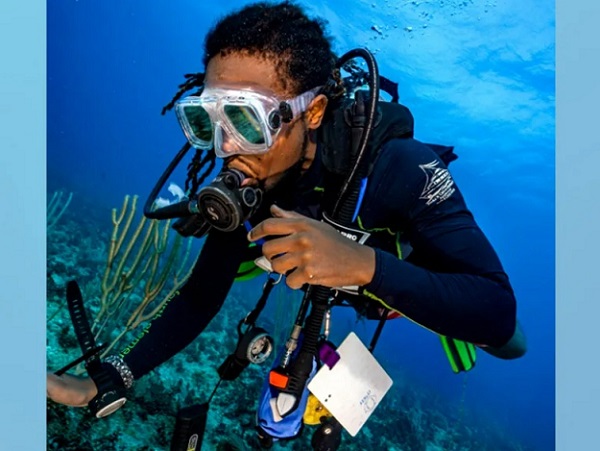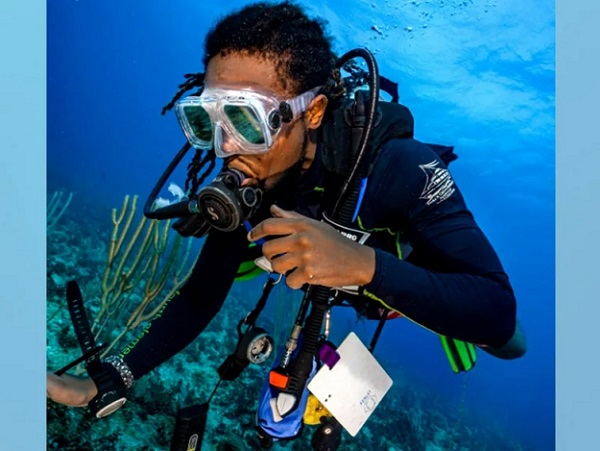
Gemma Handy (St John’s, Antigua) reports on ongoing efforts on Turks and Caicos to protect reefs from stony coral tissue loss disease; see full article in BBC News.
If Reginald Beckford had been told a few years ago that he would later make a living as a scuba diving instructor, he would probably have laughed. A long-held fear of sharks meant he preferred to keep his feet firmly on dry land. That is until he saw what lay beneath the ocean’s surface. Today, the 32-year-old is not just enabling others to experience the underwater world; he is playing a key role in helping protect the planet’s third-largest barrier reef from the deadliest coral sickness ever recorded.
Reginald is part of a team of ardent reef protectors in the Turks and Caicos Islands which, in 2019, became the seventh Caribbean country confirmed as being affected by stony coral tissue loss disease (SCTLD). Almost a decade after it first appeared off the coast of Florida, the malady has spread like wildfire and is now known to be present in 28 nations across the region.
It was while working as a night watchman on a dive boat that Reginald was encouraged to venture into the water. “The first time I went scuba diving it was surreal, it was like a different world,” he recalls. “Once I saw what we had down there, I wanted to help preserve it in any way I could.”
The British territory’s resplendent coastline has attracted tourists for decades. But the disease’s rapid contagion has seen every stretch of the archipelago’s reef impacted to some degree, heightening fears for both the marine environment and the livelihoods of those who rely on it.
Since qualifying as a dive instructor five years ago, Reginald has trained more than 100 students, some of whom are now also working to help stem SCTLD’s devastating effects.
The efforts are being led by the TC Reef Fund, a donation-dependent NGO comprised almost entirely of volunteers, working closely with the government’s environment department. The illness affects more than 30 species of coral, often killing them within weeks of becoming infected.
Part of Reginald’s work is helping apply an antibiotic paste to sick corals, a method which has seen significant success in halting the spread. While it does not stop them becoming re-infected, it can keep a colony alive long enough for it to reproduce.
Reginald is not the only volunteer to have undergone a career change to join the fight against the disease. Former teacher Arenthia Baker moved to the islands, her mother’s birthplace, from Florida in 2021 during the Covid pandemic. [. . .]
Exacerbating the reef’s plight are unusually warm seas experienced over the summer, which fuelled widespread coral bleaching across the Caribbean. “Seeing the bleaching head-on was heart-wrenching,” Arenthia says. “People don’t understand corals are animals, they’re living creatures, and when they’re fighting for their lives because of bleaching they’re more susceptible to disease.” Still, Arenthia says she remains “optimistic” the team can win the battle against SCTLD.
There is reason to be hopeful.
Earlier this year, it was revealed that researchers with the Smithsonian’s National Museum of Natural History had discovered the first effective bacterial probiotic for treating SCTLD. The findings signal a significant breakthrough given concerns that the current use of amoxicillin risks promoting antibiotic-resistant bacteria.
Meanwhile, Turks and Caicos has become something of a trailblazer for research into reef restoration.
In addition to two in-water coral nurseries, a major part of the pioneering work under way is a land-based biobank – a first for the Caribbean’s British territories – made possible with funding from the London-based John Ellerman Foundation. [. . .]
Fragments of healthy coral are removed from the water and housed in tanks with the aim of eventually replanting their offspring onto the reef.
With so many coral species affected by the killer ailment, preserving genetic diversity is crucial, explains the Reef Fund’s executive director Alizee Zimmermann.
To stretch the organisation’s limited resources, local carpenters were enlisted to craft the tanks which act as a “coral ark”, holding dozens of samples of the 10 most susceptible species.
Ensuring the best conditions to help the corals thrive is a complex process. The team makes its own synthetic seawater containing the ideal balance of minerals. [. . .]
For full article, see https://www.bbc.com/news/world-latin-america-67647402
[Photo above by Patricia Guardiola: Reginald Beckford says that diving is like entering a different world.]
Gemma Handy (St John’s, Antigua) reports on ongoing efforts on Turks and Caicos to protect reefs from stony coral tissue loss disease; see full article in BBC News. If Reginald Beckford had been told a few years ago that he would later make a living as a scuba diving instructor, he would probably have laughed.






